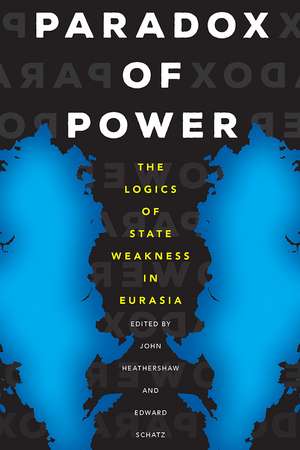Paradox of Power: The Logics of State Weakness in Eurasia: Central Eurasia in Context
Editat de John Heathershaw, Edward Schatzen Limba Engleză Paperback – 3 aug 2017
“State weakness” is seen to be a widespread problem throughout Central Asia and other parts of postsocialist space, and more broadly in areas of the developing world. Challenging the widespread assumption that these “weak states” inevitably slide toward failure, Paradox of Power takes careful stock of the varied experiences of Eurasian states to reveal a wide array of surprising outcomes. The case studies show how states teeter but do not collapse, provide public goods against all odds, interact with societies in creative ways, utilize coercion effectively against internal opponents, and establish practices that are far more durable than the language of “weakness” would allow. While deepening our understanding of the phenomenon in Eurasia in particular, the essays also contribute to more general theories of state weakness.
Din seria Central Eurasia in Context
- 15%
 Preț: 538.27 lei
Preț: 538.27 lei -
 Preț: 429.12 lei
Preț: 429.12 lei -
 Preț: 358.46 lei
Preț: 358.46 lei -
 Preț: 246.86 lei
Preț: 246.86 lei -
 Preț: 358.46 lei
Preț: 358.46 lei -
 Preț: 387.82 lei
Preț: 387.82 lei -
 Preț: 422.97 lei
Preț: 422.97 lei -
 Preț: 389.76 lei
Preț: 389.76 lei -
 Preț: 424.88 lei
Preț: 424.88 lei -
 Preț: 386.88 lei
Preț: 386.88 lei -
 Preț: 385.91 lei
Preț: 385.91 lei -
 Preț: 425.64 lei
Preț: 425.64 lei -
 Preț: 421.03 lei
Preț: 421.03 lei -
 Preț: 387.82 lei
Preț: 387.82 lei -
 Preț: 382.25 lei
Preț: 382.25 lei -
 Preț: 423.91 lei
Preț: 423.91 lei -
 Preț: 386.88 lei
Preț: 386.88 lei -
 Preț: 422.97 lei
Preț: 422.97 lei -
 Preț: 385.91 lei
Preț: 385.91 lei -
 Preț: 384.92 lei
Preț: 384.92 lei -
 Preț: 384.00 lei
Preț: 384.00 lei
Preț: 421.03 lei
Nou
Puncte Express: 632
Preț estimativ în valută:
80.56€ • 84.34$ • 66.66£
80.56€ • 84.34$ • 66.66£
Carte tipărită la comandă
Livrare economică 07-21 aprilie
Preluare comenzi: 021 569.72.76
Specificații
ISBN-13: 9780822964414
ISBN-10: 0822964414
Pagini: 344
Dimensiuni: 152 x 229 x 23 mm
Greutate: 0.41 kg
Ediția:1
Editura: University of Pittsburgh Press
Colecția University of Pittsburgh Press
Seria Central Eurasia in Context
ISBN-10: 0822964414
Pagini: 344
Dimensiuni: 152 x 229 x 23 mm
Greutate: 0.41 kg
Ediția:1
Editura: University of Pittsburgh Press
Colecția University of Pittsburgh Press
Seria Central Eurasia in Context
Recenzii
“An impressive collection, providing fresh, original analysis. This volume presents a solid mix of common themes and individual, compelling chapters, and fascinating topics. Heathershaw and Schatz wrestle with an important concept--the strong-weak state distinction—and offer a conceptual set of alternative roles and dynamics that they observe states playing in the post-Soviet space. It will become a standard source on the topic of the state in Eurasia.”
—Alexander Cooley, Columbia University
—Alexander Cooley, Columbia University
“A thrill to read. Paradox of Power is at once theoretically compelling and empirically rich. We desperately need to understand how these states function, and step into the ‘shadows’—shadows that we ourselves cast—and look anew at how Eurasian governments work. This volume makes that step, allowing the reader to evaluate anew the weaknesses, but equally important, the strengths of the enduring Eurasian state.”
—Eric McGlinchey, George Mason University
—Eric McGlinchey, George Mason University
Notă biografică
John Heathershaw is associate professor of international relations at the University of Exeter, UK. He has served on the board of the Central Eurasian Studies Society and the European Society for Central Asian Studies. He is the author of Post-Conflict Tajikistan: The Politics of Peacebuilding and the Emergence of Legitimate Order and coauthor of Dictators without Borders: Power and Money in Central Asia.
Edward Schatz is associate professor of political science at the University of Toronto, where he is also director of its Central Asia Program. A former president of the Central Eurasian Studies Society, he is the editor of Political Ethnography: What Immersion Contributes to the Study of Power and the author of Modern Clan Politics: The Power of “Blood” in Kazakhstan and Beyond.
Edward Schatz is associate professor of political science at the University of Toronto, where he is also director of its Central Asia Program. A former president of the Central Eurasian Studies Society, he is the editor of Political Ethnography: What Immersion Contributes to the Study of Power and the author of Modern Clan Politics: The Power of “Blood” in Kazakhstan and Beyond.
